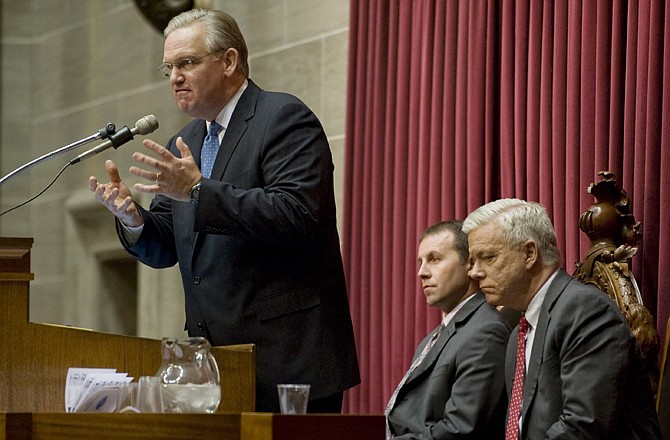Missouri Gov. Jay Nixon tried to make sure everyone knows he likes job growth, be it 800 workers promised by global technology company IBM or three additional employees at a rural sawmill.
Nixon cited numerous business expansions helped along by his administration and used the word "jobs" about three dozen times Wednesday night in a State of the State speech that sought to highlight his efforts to aid Missouri's economy.
It was the governor's attempt to put a positive spin on a shrinking state budget that would cut aid for colleges, hold public school spending flat, eliminate about 860 full-time state employees and scrap or cap some of Missouri's many tax credit programs for businesses and developers.
"Times are tough. Too many folks can't make ends meet, can't find the jobs they want, or worry they'll lose the jobs they have," the Democratic governor acknowledged in his speech to a joint session of the Republican-led House and Senate.
But "my focus is crystal clear," Nixon added. "By fighting every day for every job, we will turn this economy around."
Nixon's potential Republican challenger - Lt. Gov. Peter Kinder - countered that the governor was merely "showboating and grandstanding" by flying around the state to nearly every local job announcement possible.
"Governor Nixon has been AWOL on the issues that matter most to you and your family," Kinder said in a rebuttal. "Sure, he loves the perks of the job - the ribbon cuttings, the prime seats at sporting events, the taxpayer-funded airplane - but he's nowhere to be found on the troubles facing our state."
Nixon proposed a $23.1 billion operating budget for the fiscal year that begins July 1 - down at least a couple hundred million dollars from the budget lawmakers approved for the current fiscal year.
His plan would provide K-12 schools an additional $112 million during the current year, thanks to an influx of federal money that must be spent this school year. But it would cut schools by that same amount next year. Nixon's budget director, Linda Luebbering, says schools will be asked to carry over some of this year's additional money into next year.
Even so, schools would be getting far less than the amount they are due. Schools were budgeted to get about $3 billion in basic aid this year. They would be due an increase of about $233 million next year if Missouri were to provide the full amount called for by its funding formula.
Some school officials were happy just to avoid a cut in basic aid. School busing aid, which Nixon cut by nearly half this year, would rise slightly under his plan for next year.
"Overall, given the state's fiscal situation, this is good news," said Brent Ghan, a spokesman for the Missouri School Boards' Association.
Public colleges and universities would take a 7 percent cut next year under Nixon's proposal - an additional $64 million reduction on top of the $50 million cut they received this year.
But Nixon proposed to reverse a small portion of the cuts he made this year to Missouri's main college scholarship programs. He proposed a bonus college scholarship to high school students who score well on certain math and science tests. And Nixon said he wants to expand a community college scholarship to graduates of all high schools, instead of only some schools - receiving bipartisan applause while reviving a pledge from his 2008 gubernatorial campaign.
The governor's budget plan estimates the expanded scholarship would cost $8 million. It was one of the few new programs in his budget.
Nixon proposed using private contractors to replace some of the several hundred state employee positions he is seeking to eliminate.
Senate Appropriations Chairman Kurt Schaefer, R-Columbia, who has many state employees in his district, said the proposed job cuts were concerning.
"We've got a lot of hard-working Americans and Missourians that work for state agencies and work for the public school system and work for higher education," Schaefer said. "You can't discount a job simply because it's a job in the public sector."
The Communications Workers of America, Local 6355, which represents employees in the health and social services departments, said it was "flabbergasted and outraged" that Nixon was proposing "massive cuts" instead of proposing ways to raise state revenues.
Nixon's budget includes about $45 million of assumed savings that are dependent upon legislators changing state laws.
One such change would provide an amnesty period for taxpayers who owe Missouri money but have not yet been cited by the Department of Revenue. If the businesses or individuals pay up, they can avoid penalties and be charged only half the interest they otherwise would owe. The governor's budget assumes the program will bring in $20 million that otherwise would not have been paid.
Nixon also assumes savings from the elimination of several tax credits, including ones for filmmakers and another for wine and grape producers. He also wants lawmakers to reduce the amount of annual tax credits that can be issued for the renovation of historic buildings - a tool that developers have used extensively in older parts of St. Louis.
House Speaker Steven Tilley said he was willing to consider eliminating tax credit programs that are not working but opposed shrinking the historic tax credit program.
"That will be a nonstarter in the House," said Tilley, R-Perryville.

